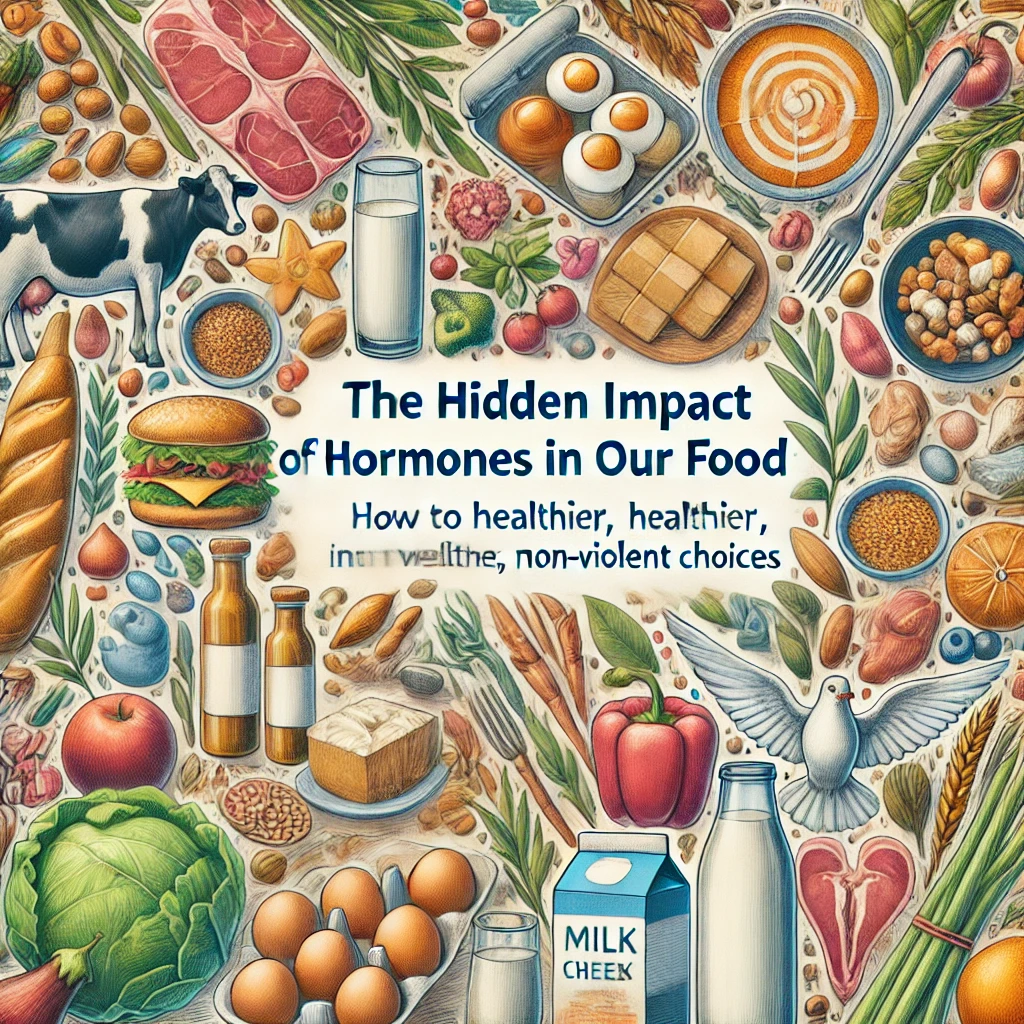The Hidden Impact of Hormones in Our Food: How to Make Healthier, Non-Violent Choices
In today’s world, where fast food and processed items are easily accessible, it’s essential to understand the consequences of the food we consume. Much of the food we eat today, especially animal-based products, is filled with hormones, many of which have an impact on our health. These hormones, injected into animals to increase production, are ultimately passed on to us when we consume milk, meat, or eggs, leading to potential health problems.
The Hidden Hormones in Our Food
Hormones play a significant role in the lives of animals, especially in the dairy and meat industries. Dairy cows, for example, are often injected with hormones to increase milk production. These hormones are not only passed into the milk but also enter our bodies when we consume these products. Similarly, animals raised for meat consumption are injected with hormones to accelerate growth.
These hormones can disrupt our body’s natural hormonal balance, contributing to conditions like PCOD (Polycystic Ovary Disease) and uterine fibroids, among others. What’s more alarming is that the hormones used in these industries are synthetic, meaning they don’t mimic the natural hormonal processes of the body. They can wreak havoc on our health, leading to problems like hormonal imbalances, diabetes, thyroid issues, and even more severe conditions like breast cancer.
The Sugar Connection: A Hidden Danger
One of the most alarming impacts of the food we eat is its effect on our blood sugar levels. Hormones in animal products, especially milk, can contribute to higher blood sugar levels, which can lead to insulin resistance and Type 2 diabetes over time. Sugar is already present in various foods in different forms, but did you know that many processed foods, including those labeled “healthy,” contain hidden sugars? These sugars are often disguised under different names, making it difficult for consumers to identify them.
It’s important to recognize the danger of consuming excessive sugar. The body can only tolerate a certain amount of sugar, and when we consume foods loaded with hidden sugars or hormones, the effects on our health can be severe. In fact, when people go on medications for blood sugar control, they often don’t realize that controlling their sugar intake through a healthy, balanced diet is just as crucial. The key is to be mindful of what we eat and focus on natural, unprocessed foods.
Can Diabetic Patients Donate Blood?
A common question among individuals dealing with diabetes is whether they can donate blood. The answer is that as long as your sugar levels are within a safe range and you’re not on insulin, donating blood should be fine. Blood banks don’t typically refuse diabetic patients, but it’s essential to maintain normal blood sugar levels before donating. If a person is on insulin, they may not be allowed to donate because their sugar levels can fluctuate drastically, which could pose a risk to both the donor and the recipient.
A Path to Healing: Resetting Your Body
One way to restore balance to your body and manage sugar levels naturally is through dietary and lifestyle changes. In wellness camps, there are structured programs that help individuals reverse diabetes and other conditions through food and lifestyle adjustments. Within three days, the body’s rhythm can be reset, and blood sugar levels can stabilize without the use of medication.
Here’s a simple process to start:
- Wake up early: The day begins 90 minutes before sunrise, aligning the body with the natural rhythm of the day.
- Rebalance your diet: Focus on whole, plant-based foods that provide the nutrients the body needs without overloading it with hormones and sugar.
- Exercise regularly: Moderate activity helps the body maintain healthy blood sugar levels.
- Mindset matters: Stress and negative thinking can worsen blood sugar levels, so it’s important to maintain a positive outlook.
The Natural Wisdom of Non-Violent Choices
One of the key messages that emerge from this understanding of hormones and food is the importance of choosing a path of non-violence when it comes to our food choices. By reducing our consumption of animal products and processed foods, we can protect our bodies from the harmful effects of hormones and unhealthy sugar levels.
The path of ahimsa, or non-violence, is not just about compassion for animals—it’s about understanding the bigger picture of how our choices impact our health, the environment, and the planet. By adopting a plant-based, non-violent lifestyle, we can reduce our exposure to harmful hormones and contribute to better overall health.
Conclusion: Taking Control of Your Health
It’s clear that the food we eat today plays a significant role in our health, from blood sugar levels to hormonal balance. By being mindful of what we consume and making healthier, non-violent choices, we can reverse many of the conditions caused by modern diets. Whether it’s reducing our sugar intake, avoiding hormone-laden animal products, or adopting a more plant-based lifestyle, the power to heal our bodies is in our hands.
If you’re ready to take control of your health and reset your body, the first step is to understand the science behind these choices. Remember, your health is a result of the decisions you make every day. Start with small, sustainable changes, and you’ll see long-term benefits.
Let us know your thoughts, and feel free to share your journey towards a healthier, more balanced life!
Read :The story of Bangalore techie Atul Subhash
